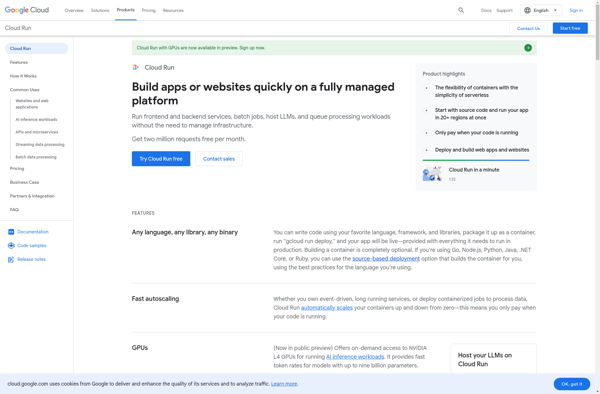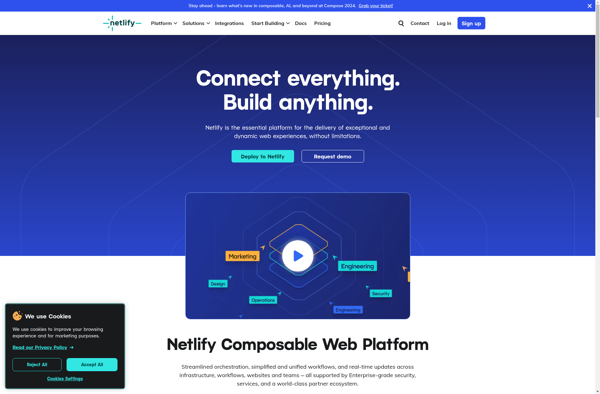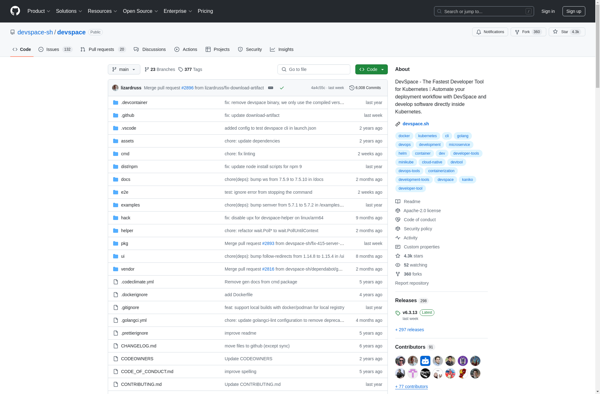Google Cloud Run
Google Cloud Run is a serverless platform that enables developers to deploy stateless containers quickly and easily. It abstracts away infrastructure management, autoscales, and bills only for resources used.

Google Cloud Run: Serverless Container Deployment
Google Cloud Run is a serverless platform that enables developers to deploy stateless containers quickly and easily. It abstracts away infrastructure management, autoscales, and bills only for resources used.
What is Google Cloud Run?
Google Cloud Run is a managed compute platform that enables developers to run stateless containers in a serverless environment. Key features of Cloud Run include:
- Fully managed infrastructure - Cloud Run handles all infrastructure management and configuration behind the scenes, so developers can focus on code.
- Auto scaling - Cloud Run autoscales each revision from 0, meaning no instances running and no cost when idle.
- Pay per use pricing - Users are billed only for the resources used to run the containers, down to the 100ms.
- Fast deployments - Containers can be deployed quickly from the console or by using the CLI/API.
- Open source support - Cloud Run supports running containers from public images in Docker Hub or Google Container Registry.
- Integrated with other Google Cloud services - Easy to leverage other GCP services like Cloud Build, Artifact Registry, etc.
Overall, Cloud Run makes it easy for developers to deploy and run modern containerized applications in a serverless environment, paying only for the resources used. The auto scaling and managed infrastructure makes it ideal for workloads with fluctuating demand.
Google Cloud Run Features
Features
- Serverless container execution
- Automatic scaling
- Pay-per-request pricing
- Quick deployment from Docker containers
- Integration with other GCP services
- Built-in HTTPS load balancing
- Traffic splitting between revisions
- Open source ecosystem
Pricing
- Pay-As-You-Go
Pros
No server management
Scales automatically
Pay only for what you use
Fast deployments
Leverages other GCP services
HTTPS by default
Canary deployments
Portable between environments
Cons
Stateless only
Cold starts can cause latency
Vendor lock-in on GCP
Limit of 2 vCPU per container
No custom domains
Not ideal for long running processes
Official Links
Reviews & Ratings
Login to ReviewThe Best Google Cloud Run Alternatives
Top Ai Tools & Services and Cloud Computing and other similar apps like Google Cloud Run
Vercel
Vercel is a cloud platform developed by Vercel Inc for static web application and web services deployment, aimed primarily at front-end web and mobile developers. It enables developers to deploy websites and web services that automatically scale to handle high traffic loads without needing to provision or manage servers.Key features...

Fly.io
Fly.io is a platform as a service (PaaS) designed specifically for deploying and running modern web applications. It handles all infrastructure, dependencies, routing, and scaling automatically, allowing developers to focus solely on building their applications rather than managing servers.Some key features of Fly.io include:Global edge network - Fly deploys applications...

Heroku
Heroku is a cloud platform as a service (PaaS) that streamlines the process of building, deploying, and scaling applications. Founded in 2007 and later acquired by Salesforce, Heroku has become a popular choice for developers seeking a straightforward and scalable platform for hosting web applications. Heroku abstracts much of the...

Render
Render is a cloud-based graphics rendering service designed to help creative professionals access fast and scalable rendering power without investing in expensive local hardware. The service utilizes a large network of GPUs in the cloud to process rendering tasks quickly and efficiently.Some key features of Render include:Easy integration with popular...

Netlify
Netlify is a cloud computing company that offers hosting and serverless backend services for static websites and web applications. It provides developers and businesses with modern tooling and workflows to build faster, more scalable web projects without having to worry about infrastructure management.Some key features of Netlify include:Automated builds -...

OpenShift
OpenShift is a cloud platform as a service developed by Red Hat that allows developers to quickly develop, host, and scale applications in a cloud environment. Some key things to know about OpenShift:It provides pre-configured application environments to support quick application deployment in languages like Java, Python, PHP, Ruby, Node.js...

Qovery
Qovery is a platform designed to simplify and accelerate application deployment and operations across multiple cloud providers. It provides a unified interface to deploy to AWS, GCP, Azure, and private clouds.Some key capabilities of Qovery include:Infrastructure provisioning and management - Qovery handles all the infrastructure provisioning, configuration, scaling, security, etc....

Platform.sh
Platform.sh is a platform as a service designed for hosting web applications. Some key features include:Supports popular frameworks like PHP, Python, Ruby, Node.js, JavaAutomated infrastructure management and deployment workflowsIntegrated CI/CD to easily build, test and deploy applicationsAutomatic scaling, health monitoring, and securityGlobal CDN for asset acceleration with cachingSupport for custom...

DevSpace (for Kubernetes and Docker)
DevSpace is an open-source client-side tool that helps streamline building, deploying and debugging applications with Docker and Kubernetes. It aims to improve developer workflows and productivity when working with containers and Kubernetes.Some key features of DevSpace include:Fast iterative development - DevSpace enables quick code changes, auto redeployments to Kubernetes and...
